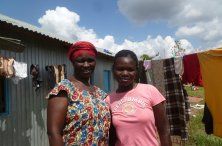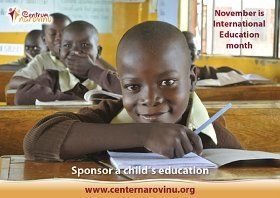It has been 11 years now since two friends of mine, the owners of CK Brenna travel agency, started to support the distance adoption project of Centrum Narovinu. In 2002, they became adoptive parents of then six-year-old Philomena Aoko from Nairobi. While being on holiday in Eastern Africa at the beginning of this year, I had a chance to visit the girl and her family.
Alhough the decision about visiting Philomena had been taken shortly before our departure, we had no problems to organize it. Three e-mails exchanged between us and Mrs Feminova were all we had to do. We told her the approximate date of our visit and in return we received the contact to the local coordinator responsible for arranging visits. The original date of our visit was set on Monday, January 7, the first school day after a long (I think one moth's) holiday. We were supposed to meet Philomena at school in the morning and then spend the afternoon with her family. But later we had to change our itinerary and finally the only time we were able to see the girl was Sunday afternoon.
We phoned Ben, the coordinator, just three days before the visit was to be paid. Still it was not a problem to put it off for another day. He picked us up from the hotel on Sunday morning at nine to drive us to the place. We were really surprised he arrived on time because our previous experience made us expect he would be at least one hour late. Here in Africa, time is somehow less important than in Europe. Ben, whose Czech vocabulary was surprisingly good, first helped us to buy some sweets for Philomena's five siblings and then we set off.
Our journey from the city centre where we were staying to Philomena's home at the suburbs of Nairobi took about half an hour. Philomena and a local coordinator were waiting for us in the middle of the main (and only) street surrounded by a jumble of huts made from logs, timbers and sheets of corrugated iron. All of us were a bit shy at first but before we managed to walk through the maze of narrow streets taking us to her home, the ice started to melt to get broken completely when we met her mum who gave us a warm and wild welcome. She grabbed the bag with sweets without hesitation and rushed into the house to check what we had brought. It didn't take her long to examine the stuff and in a few minutes she could show us into the house just as good hostesses do.
The first and main room in African houses is usually a living room. This one looked the same as the others we had seen here, just it was smaller and its ceiling and walls were made from corrugated iron. But we were pleased to see it was very clean. In the centre of the room, there was a low table with a sofa and two or three armchairs. The walls were covered with curtains and decorated with photographs of children, plush toys and kitsch pictures. A BRENNA ball which Philomena got from her adoptive parents when she was a little girl was hanging from the cealing right in the middle of the room.
Soon the house became very crowded. There were eleven of us, even Philomena's uncle, her mum's brother and apparently head of the family, arrived to talk to us. Mum was given some money for food and household and Philomena got her present – a watch we bought for her. Unfortunately we could not hand her the parcel with presents and a letter from Brenna girls because our friend who was supposed to bring it had called off his journey. But we assured the family the parcel would arrive by post soon so noone seemed to be disappointed or sad especially when we promised Philomena's mum there would be a small gift for her in it too.
Then we talked mostly about Philomena, about things she likes, her school results and a job she would like to have one day. She asked a lot of questions about her sponsors because they had visited her before so she already knew them personally. It was obvious that she and her uncle appreciated the chance she had been given through adoption at distance. Education is not a thing that children with social background like hers take for granted and without this chance, the seventeen-year old girl would be uneducated, jobless and with no prospects for future. Finally we were offered a slice of sweet toast bread and cup of tea with milk which we could not refuse.
Although, compared with other places in Africa, Nairobi has quite a pleasant sort of climate, it was very hot inside the house so after about an hour we apologized and went to see Philomena's grandma living on the other side of the slum right next to a church built – of course - from corrugated iron where a Sunday mass was just being served. While we were walking along the streets, local people were greeting us with their friendly smiles. Grandma's hut, devided into two rooms by a curtain, was much less clean than Philomena's house but grandma herself was a very friendly, outgoing and fun-loving person. A few photos were taken and in the early afternoon we were accompanied back to our car and asked to give their warm greetings to Philomena's adoptive parents. Our visit was over.
Ben gave us a lift to the bus station and helped us to find a bus to Mombasa. We paid him one thousand shillings (about 220 Kč) for petrol, wished him good luck in Czech and left, feeling our visit to Philomena had given to our journey a special flavour. And looking back now, we are sure it was one of the most important moments of it. If you have an adopted child in Africa and you have not met them yet, I do recommend you to do so. It will surely be an experience you will never forget. You can make it a pretext to visit this beautiful, wild continent.
Karel Musil

































